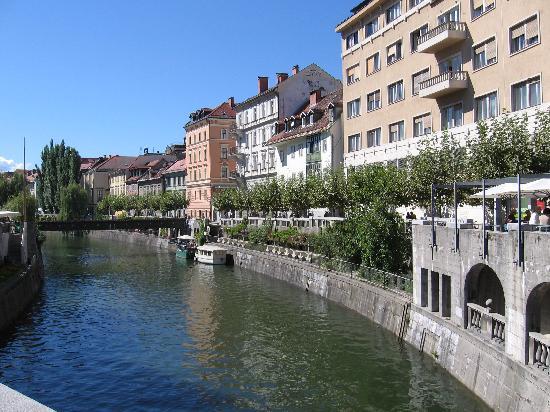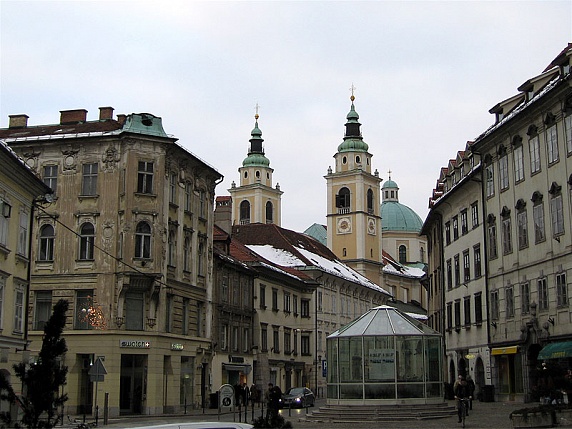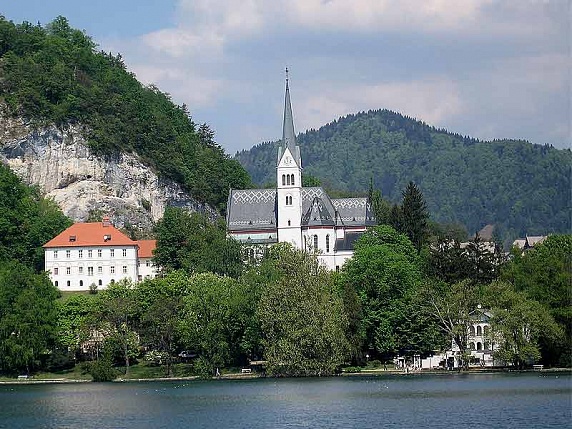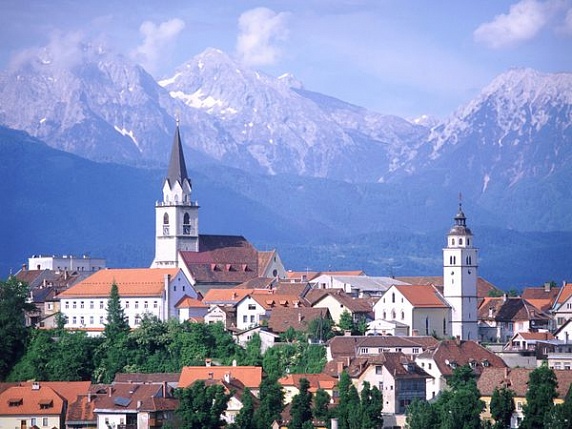 la República de Eslovenia
la República de Eslovenia
Foreign Minister Sergey Lavrov’s remarks and answers to media questions at a joint news conference following talks with Deputy Prime Minister and Minister of Foreign Affairs of the Republic of Slovenia Karl Erjavec Ljubljana, February 21, 2018
Ladies and gentlemen,
We feel at home and among friends here. Thank you for inviting us, for organising our work so well and for the traditional Slovenian hospitality.
As usual in our relations, today we had a very open discussion of bilateral relations, primarily in the context of the agreements that were signed in the past two years during the exchange of visits by President of Russia Vladimir Putin to Slovenia and President of Slovenia Borut Pahor to Russia.
We pointed out the rapid growth of mutual trade and positive trends and results in the investment sphere. We see this as a vital intermediary performance result of the Intergovernmental Commission on Trade, Economic, Scientific and Technical Cooperation, which is co-chaired by Deputy Prime Minister and Minister of Foreign Affairs of the Republic of Slovenia Karl Erjavec and Minister of Communications and Mass Media of the Russian Federation Nikolai Nikiforov. The commission relies in its operation on the vigorous activities of the business councils and ties between Russian regions and their Slovenian partners. We are implementing several promising investment projects in Slovenia and in Russia, which involve both Russian and Slovenian companies.
We are promoting our traditionally rich cultural ties, which we discussed in depth today, in particular, the International Forum of Slavic Cultures, which is headquartered in Ljubljana and was established at the joint initiative of Russia and Slovenia. This forum, a branch of which opened in Moscow 18 months ago, is facilitating closer ties between Slavic nations and the preservation of Slavic cultural heritage. We attach great importance to this part of our humanitarian cooperation.
We hold successful overlapping cultural seasons, with Ljubljana hosting numerous interesting performances by Russian musicians, including performances by the Mariinsky Theatre Orchestra, conducted by Valery Gergiev, and the Alexandrov Academic Song and Dance Ensemble of the Russian Army. Foreign Minister of Slovenia Karl Erjavec has mentioned a truly landmark event, the opening of the first EU subsidiary of Lomonosov Moscow State University on the basis of University of Primorska in Koper in the Slovenian Littoral Region.
We have discussed an initiative advanced by the Slovenia-Russia Friendship Society and the Russian Society of Friendship and Cultural Ties with Slovenia, which seeks to establish the Russian-Slovenian Public Forum. We have supported this initiative.
We have focused on the military memorials issue. Russia greatly appreciates Slovenia’s solicitous treatment of Soviet and Russian soldiers’ graves and monuments to them in this country. Today, we have laid wreaths at a monument to the Sons of Russia and the Soviet Union who were killed in Slovenia during both First and Second World Wars. We consider it important to support the creation of a similar memorial dedicated to Slovenian nationals in the Russian Federation.
Today, we will sign a memorandum on cooperation regarding the activities of an international centre to research World War II issues. The centre has been established at a museum in Maribor (inside a former German concentration camp for Soviet prisoners of war). We consider this joint research project to be very important. We will involve various departments, primarily Russia’s Defence Ministry, Ministry of Culture and Ministry of Education and Science, in this project. I believe that very good results can be obtained, and these results will have paramount significance for the younger generation to have a correct understanding of the outcomes of World War II.
While discussing international issues, we praised Slovenia’s position regarding Russia-EU and Russia-NATO ties. This position implies that EU and NATO membership does not necessarily call for terminating ties with all other members of the international community, no matter how much someone might want this to happen. Just like Slovenia, Russia is ready to cooperate with any other state which is open to equitable, mutually beneficial interaction based on a balance of interests.
We consider it absolutely incorrect and harmful to present certain countries with a false choice between aligning with the West or with the East. Unfortunately, some of our Western colleagues are guided by precisely this logic while addressing cooperation with countries in the western Balkan region, and not only there. The same either-or principle is applied to some post-Soviet states. This principle was a major cause of the protracted Ukrainian crisis. We believe that there is no alternative to the Minsk Agreements for resolving the situation in Ukraine.
We hope that the West, primarily Berlin and Paris, as well as the other capitals of countries of the Normandy format, realise that the latest actions of the Ukrainian leadership deviate from compliance with the Minsk Agreements and are an attempt to scrap them. First of all, I am talking about the so-called law on the reintegration of Donbass, which allows and even encourages the use of force for restoring the territorial integrity of Ukraine. We consider this to be absolutely unacceptable. Attempts to ignore the Minsk Agreements, approved by the UN Security Council, are followed by attempts to violate other documents of international law, first of all, those guaranteeing equal rights for languages of ethnic minorities and regional languages. The law on education, which has already entered into force in Ukraine, aims to undermine these obligations. We insist that the recommendations of the Venice Commission of the Council of Europe regarding this law be followed without delay.
We are confident that Europe cannot fail to see the extremely dangerous increase in nationalist, xenophobic and neo-Nazi sentiments in Ukraine; and these sentiments are being acted on more and more often. I am talking about the attempt to set fire to a Hungarian church in Trans-Carpathia, the rampage at the Russian Centre of Science and Culture in Kiev and attempts to attack bank affiliates. Even judging by Ukrainian news stories (unlike the people of Ukraine, Russian citizens can read the neighbouring country’s press), there are many indications that Ukrainian authorities passively observe and largely encourage all these actions, including attacks on the Russian Centre of Science and Culture and the burning of the Russian flag. For example, this was how police officers, summoned to the scene of the incident, acted. We are waiting for the appropriate principled response from the UN, the OSCE, the Council of Europe and, of course, from the European Union and NATO because the latter two organisations are always particularly worried about the destiny of the Ukrainian state and the future of the Ukrainian peace settlement.
We also discussed other foreign policy issues, including the situation in various hot spots in the Middle East and North Africa. Despite attempts to undermine the Syrian settlement, Russia, alongside Iran and Turkey, acting within the Astana format, and with UN sponsorship, will do everything as part of the Geneva process to implement UNSC Resolution 2254.
Of course, salient issues in a number of other countries in the region (Libya, Yemen and Iraq), should not sidetrack the need to settle relations between Palestine and Israel. This issue is fundamentally important for the future of the Middle East. We are in favour of direct talks between Israel and Palestine, Israeli Prime Minister Benjamin Netanyahu and President of the State of Palestine Mahmoud Abbas, without any preliminary conditions. We consider this a critical step in the current difficult and unsettled situation.
Once again, I would like to thank Deputy Prime Minister and Foreign Minister Karl Erjavec, his entire team, and our Slovenian friends for their hospitality. We will look forward to reciprocating your hospitality. I invite Mr Erjavec to come to Russia on a regular visit.
Question: You mentioned yesterday that Turkey could resolve its security issue in connection with the situation in Afrin through a direct dialogue with Damascus. Is Moscow ready to promote such a dialogue or, perhaps, it is already doing so?
Sergey Lavrov: We have already said more than once that it is only possible to resolve all current issues in Syria, which occasionally tend to be aggravated, solely on the basis of respect for Syria’s sovereignty and territorial integrity. This is a universal criterion. It is important for all external parties, especially those who are present in Syria, to realise the need to start a dialogue with the Syrian government based on the principle of Syrian sovereignty and territorial integrity, which has been repeatedly confirmed by the UN Security Council. All ethnic, religious and other groups residing in Syria also must respect Syria’s territorial integrity.
The fact that a portion of the Kurdish population in northern Syria declared autonomy awhile back was not helpful in achieving a settlement. The actions taken by the US-led coalition to promote the autonomy of the Kurds and even to promote the establishment of local government bodies, which were openly portrayed as disobeying Damascus, did not help, either. Finally, the Syrian government itself should also be guided by the principle of sovereignty over the entire territory of its country. This implies the need to talk with all representatives of ethnic or religious groups, including the Kurds. Russia’s work with all the participants in Syrian events is based on this. We believe that this an absolutely viable foundation on which to stop the bloodshed, and to begin a sustainable settlement process, which will ensure not only the interests of the Syrian people in all their diversity, but, I am convinced, the legitimate interests of Syria’s neighbours and other external actors.
Question: Recently, a lot of criticism has been heard in Slovenia and beyond its borders regarding Ljubljana’s policy which neglects relations with the United States and seeks to strengthen its relations with Russia. What can you tell us about this situation? What can we expect in relations between Russia and Slovenia?
Sergey Lavrov: I already commented on this in my opening remarks when I talked about the need to abandon the completely disastrous principle “either with the West or with Russia” in all foreign affairs. I'm going over the events of recent years in my head and I cannot find any evidence that Slovenia wants to pursue a policy that is more pro-Russian than pro-Western. I don’t want to speak for Karl, but I have a feeling that Slovenia would want to pursue foreign policy in such a way and to cooperate with any state that will bring it, on a reciprocal basis, the maximum trade, economic and investment benefits, and so on. Of course, like any normal country and any normal nation, the Slovene people want to preserve their cultural and spiritual identity. I don’t see this as an affront to anyone. We are fully respectful of such a multipronged approach.
Our foreign policy doctrine is also based on a multipronged approach, which means that if a mutually beneficial project arises, then, by and large, it would be foolish not to go ahead and implement it. When Slovenia proposes something to us, we consider the proposal from the perspective of our own interests. If our interests coincide, these proposals get implemented. Likewise, we come up with certain projects for Slovenia, and Slovenia responds depending on whether they meet its interests.
I don’t want to sound anti-American in any way, but just yesterday US State Department spokesman Heather Nauert publicly said with pride that US ambassadors in all countries without exception have strict instructions to issue daily demands that the respective state does not cooperate with Russia, because the United States imposed sanctions on us. I think it is enough to learn this fact to understand the principles on which the Americans are building their relations with foreign countries.








